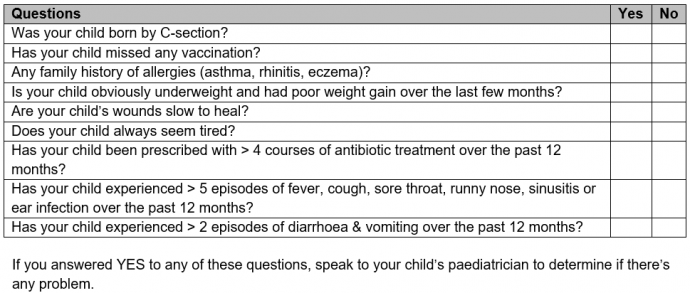Have you noticed that young children tend to get sick easily? This is because their immune system is still developing and less efficient in fighting off infections. What is the status of your child’s immunity and how can you help boost it to ensure they grow into a healthy adult?
Immunity status checker
The status of your child’s immunity is influenced by multiple factors. There are also signs that you need to pay attention to as they could indicate a weak immune system. Does any of these apply to your child?

The first line of defence
The immune system is a network of cells, tissues and organs that functions to defend our body against invaders such as bacteria and viruses. The immune system is comprised of two parts – the innate and the adaptive immune system – and the gut plays a major role as part of the innate immune system, which is also considered as the body’s first line of defence against illnesses.
Three components in the gut help to protect our body against pathogens: the gut microbiota, the intestinal epithelial layer and the mucosal immune system. In fact, it is estimated that up to 70-80% of the immune cells in our body are located within the gut. The three components work in tandem to regulate the immune response in the gut.
The gut microbiota is a collection of trillions of microorganisms that live in the gut ecosystem, and its composition is influenced by many factors, e.g. genetics, gender, age, nutrition, mode of delivery, stress, socio-economic factors, and environmental factors. Healthy and balanced gut microbiota can help the immune system by:
- Signalling the immune cells to resist pathogens
- Competing against pathogens for nutrients, thus suppressing their growth
- Creating a protective barrier on the gut lining to prevent pathogen colonisation
- Producing short-chain fatty acids (SCFAs) and other metabolites, which reduce inflammation and promote digestive health
How to boost immunity?
What can we do to keep our child healthy and ensure their immune system is functioning well? Here are some pointers:
- Healthy diet: A balanced diet consisting of a variety of foods taken in moderation is the best way to go.
- Probiotics & prebiotics: Consume probiotic-rich foods (e.g. yoghurt, kefir, tapai, some fortified milk) and prebiotics (e.g. banana, asparagus, onion).
Probiotics are good bacteria/microbes which can help to nourish the gut microbiota, while prebiotics are food for the good bacteria in the gut. Probiotics help to ensure the balance of gut microbiota, which optimally should consist of 85% good bacteria and 15% bad bacteria. Both probiotics and prebiotics play an important role to maintain gut health and hence, strengthen the immune system.
- Stay active: Encourage your child to stay active at least for 1 hour a day – it can be as simple as playing in the playground or taking a walk.
- Sufficient sleep: Make sure that your child sleeps at a regular schedule suitable to their age.
- Manage stress: Spend quality time with your child and let them express any worries to you.
- Up-to-date vaccination: Don’t miss the vaccine shots scheduled in the National Immunisation Programme and consider recommended vaccines too.
- Basic prevention: Proper handwashing, cough/sneeze etiquette, wearing face masks, avoiding crowded places – all are basic steps to prevent infection.
The pandemic has reminded us of the importance of taking care of our health and immune system. It is also crucial to know that our gut plays a major role in maintaining our immunity. Start nurturing healthy habits in your kids from young to ensure they grow into healthy adults.







Comments